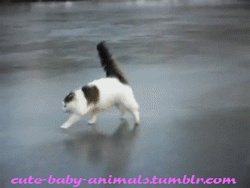Perceived intentionality is often the key to being thought competent and in control. Sometimes communicators will use prevarications and outright untruths in order to maintain their audience's impression of their capability. That ear didn't need to be licked right then.
I've often had to make the choice between presenting myself honestly as a goofball and managing my image so that it shines in a different light. Today, par exemple.
This afternoon I realized that I had quite unintentionally strayed from the syllabus in my small group communication class. I had changed my schedule last spring from the way that I'd taught the course for several years before. Instead of having four chapters before the midterm and six chapters after, I scheduled five chapters before and five after. Then this spring I let last spring's schedule roll over to without rechecking it. So last week I should have covered two chapters but instead just covered one.
I was clear with them that the midterm would just cover four chapters so I didn't feel like anyone's grade was hurt by my error. But what was I going to say about it tonight? "Oh, I'm sorry, I effed up and didn't read my schedule closely because . . . " fill in self-justifying remark having to do with tax season or self-deprecating remark about my middle-aged spaciness.
Instead, I misrepresented the facts to put myself in a better light. I apologized for not clarifying the change in the schedule and told them that I had thought that it would be better to cover two chapters next week rather than last week, now that their first paper, presentation, and midterm are over and they have more time.
Was this ethical? No one was hurt by the misrepresentation except maybe those people who maintain a ridiculously high opinion of college professors. They may continue to hold that high opinion when an honest confession of my forgetfulness might have put them wise -- ripped the fuchsia-tinted lenses from their eyes.
I see my white lie as a communication choice like that of the cat who covers his mistake by acting cool and casual. I don't always choose the cover-up. In fact, in these later years, I am more likely to admit my error. But for some reason I felt more feline today -- more interested in maintaining those few shreds of dignity I have remaining.

No comments:
Post a Comment